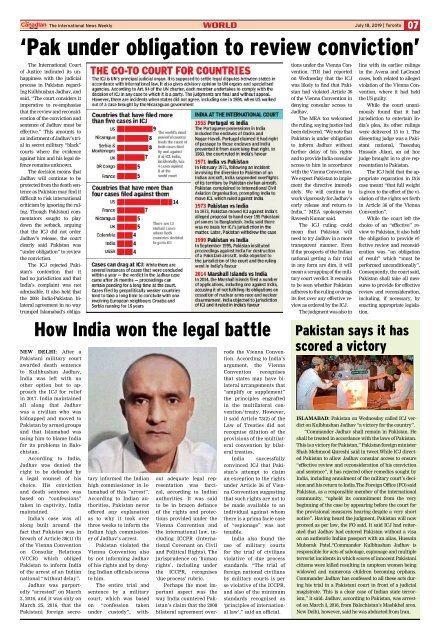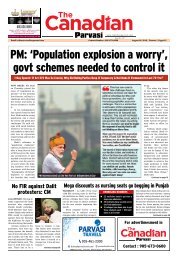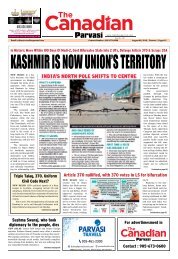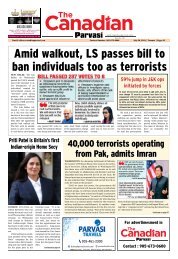You also want an ePaper? Increase the reach of your titles
YUMPU automatically turns print PDFs into web optimized ePapers that Google loves.
<strong>The</strong> International News Weekly world<br />
July 18, 2019 | Toronto<br />
07<br />
‘Pak under obligation to review conviction’<br />
How India won the legal battle<br />
New Delhi: After a<br />
Pakistani military court<br />
awarded death sentence<br />
to Kulbhushan Jadhav,<br />
India was left with no<br />
other option but to approach<br />
the ICJ for relief<br />
in 2017. India maintained<br />
all along that Jadhav<br />
was a civilian who was<br />
kidnapped and moved to<br />
Pakistan by armed groups<br />
and that Islamabad was<br />
using him to blame India<br />
for its problems in Balochistan.<br />
According to India,<br />
Jadhav was denied the<br />
right to be defended by<br />
a legal counsel of his<br />
choice. His conviction<br />
and death sentence was<br />
based on “confessions”<br />
taken in captivity, India<br />
maintained.<br />
India’s case was all<br />
along built around the<br />
fact that Pakistan was in<br />
breach of Article 36(1) (b)<br />
of the Vienna Convention<br />
on Consular Relations<br />
(VCCR) which obliged<br />
Pakistan to inform India<br />
of the arrest of an Indian<br />
national “without delay”.<br />
Jadhav was purportedly<br />
“arrested” on March<br />
3, 2016, and it was only on<br />
March 25, 2016, that the<br />
Pakistani foreign secretary<br />
informed the Indian<br />
high commissioner in Islamabad<br />
of this “arrest”.<br />
According to Indian authorities,<br />
Pakistan never<br />
offered any explanation<br />
as to why it took over<br />
three weeks to inform the<br />
Indian high commissioner<br />
of Jadhav’s arrest.<br />
Pakistan violated the<br />
Vienna Convention also<br />
by not informing Jadhav<br />
of his rights and by denying<br />
Indian officials access<br />
to him.<br />
<strong>The</strong> entire trial and<br />
sentence by a military<br />
court, which was based<br />
on “confession taken<br />
under custody”, without<br />
adequate legal representation<br />
was farcical,<br />
according to Indian<br />
authorities. It was said<br />
to be in brazen defiance<br />
of the rights and protections<br />
provided under the<br />
Vienna Convention and<br />
the international law, including<br />
ICCPR (International<br />
Covenant on Civil<br />
and Political Rights). <strong>The</strong><br />
jurisprudence on ‘human<br />
rights’, including under<br />
the ICCPR, recognises<br />
‘due process’ rubric.<br />
Perhaps the most important<br />
aspect was the<br />
way India countered Pakistan’s<br />
claim that the 2008<br />
bilateral agreement overrode<br />
the Vienna Convention.<br />
According to India’s<br />
argument, the Vienna<br />
Convention recognises<br />
that states may have bilateral<br />
arrangements that<br />
“amplify or supplement”<br />
the principles engrafted<br />
in the multilateral convention/treaty.<br />
However,<br />
it said Article 73(2) of the<br />
Law of Treaties did not<br />
recognise dilution of the<br />
provisions of the multilateral<br />
convention by bilateral<br />
treaties.<br />
India successfully<br />
convinced ICJ that Pakistan’s<br />
attempt to claim<br />
an exception to the rights<br />
under Article 36 of Vienna<br />
Convention suggesting<br />
that such rights are not to<br />
be made available to an<br />
individual against whom<br />
there is a prima facie case<br />
of “espionage” was not<br />
tenable.<br />
India also found the<br />
use of military courts<br />
for the trial of civilians<br />
violative of due process<br />
standards. “<strong>The</strong> trial of<br />
foreign national civilians<br />
by military courts is per<br />
se violative of the ICCPR,<br />
and also of the minimum<br />
standards recognised as<br />
‘principles of international<br />
law’,” said an official.<br />
<strong>The</strong> International Court<br />
of Justice indicated its unhappiness<br />
with the judicial<br />
process in Pakistan regarding<br />
Kulbhushan Jadhav, and<br />
said, “<strong>The</strong> court considers it<br />
imperative to re-emphasise<br />
that the review and reconsideration<br />
of the conviction and<br />
sentence of Jadhav must be<br />
effective.” This amounts to<br />
an indictment of Jadhav’s trial<br />
in secret military “black”<br />
courts where the evidence<br />
against him and his legal defence<br />
remains unknown.<br />
<strong>The</strong> decision means that<br />
Jadhav will continue to be<br />
protected from the death sentence<br />
as Pakistan may find it<br />
difficult to risk international<br />
criticism by ignoring the ruling.<br />
Though Pakistani commentators<br />
sought to play<br />
down the setback, arguing<br />
that the ICJ did not order<br />
Jadhav’s release, the court<br />
clearly said Pakistan was<br />
“under obligation” to review<br />
the conviction.<br />
<strong>The</strong> ICJ rejected Pakistan’s<br />
contention that it<br />
had no jurisdiction and that<br />
India’s complaint was not<br />
admissible. It also held that<br />
the 2008 India-Pakistan bilateral<br />
agreement in no way<br />
trumped Islamabad’s obligations<br />
under the Vienna Convention.<br />
TOI had reported<br />
on Wednesday that the ICJ<br />
was likely to find that Pakistan<br />
had violated Article 36<br />
of the Vienna Convention in<br />
denying consular access to<br />
Jadhav.<br />
<strong>The</strong> MEA too welcomed<br />
the ruling, saying justice had<br />
been delivered. “We note that<br />
Pakistan is under obligation<br />
to inform Jadhav without<br />
further delay of his rights<br />
and to provide India consular<br />
access to him in accordance<br />
with the Vienna Convention.<br />
We expect Pakistan to implement<br />
the directive immediately.<br />
We will continue to<br />
work vigorously for Jadhav’s<br />
early release and return to<br />
India,” MEA spokesperson<br />
Raveesh Kumar said.<br />
<strong>The</strong> ICJ ruling could<br />
mean that Pakistan will<br />
need to try Jadhav in a more<br />
transparent manner. Even<br />
if the prospects of the Indian<br />
national getting a fair trial<br />
in any form are dim, it will<br />
mean a scrapping of the military<br />
court verdict. It remains<br />
to be seen whether Pakistan<br />
adheres to the ruling or drags<br />
its feet over any effective review<br />
as ordered by the ICJ.<br />
<strong>The</strong> judgment was also in<br />
line with its earlier rulings<br />
in the Avena and LaGrand<br />
cases, both related to alleged<br />
violation of the Vienna Convention,<br />
where it had held<br />
the US guilty.<br />
While the court unanimously<br />
found that it had<br />
jurisdiction to entertain India’s<br />
plea, its other rulings<br />
were delivered 15 to 1. <strong>The</strong><br />
dissenting judge was a Pakistani<br />
national, Tassaduq<br />
Hussain Jilani, an ad hoc<br />
judge brought in to give representation<br />
to Pakistan.<br />
<strong>The</strong> ICJ held that the appropriate<br />
reparation in this<br />
case meant “that full weight<br />
is given to the effect of the violation<br />
of the rights set forth<br />
in Article 36 of the Vienna<br />
Convention”.<br />
While the court left the<br />
choice of an “effective” review<br />
to Pakistan, it also held<br />
the obligation to provide effective<br />
review and reconsideration<br />
was “an obligation<br />
of result” which “must be<br />
performed unconditionally”.<br />
Consequently, the court said,<br />
Pakistan shall take all measures<br />
to provide for effective<br />
review and reconsideration,<br />
including, if necessary, by<br />
enacting appropriate legislation.<br />
Pakistan says it has<br />
scored a victory<br />
Islamabad: Pakistan on Wednesday called ICJ verdict<br />
on Kulbhushan Jadhav “a victory for the country”.<br />
“Commander Jadhav shall remain in Pakistan. He<br />
shall be treated in accordance with the laws of Pakistan.<br />
This is a victory for Pakistan,” Pakistan foreign minister<br />
Shah Mehmood Qureshi said in tweet.While ICJ directed<br />
Pakistan to allow Jadhav consular access to ensure<br />
“effective review and reconsideration of his conviction<br />
and sentence”, it has rejected other remedies sought by<br />
India, including annulment of the military court’s decision<br />
and his return to India.<strong>The</strong> Foreign Office (FO) said<br />
Pakistan, as a responsible member of the international<br />
community, “upheld its commitment from the very<br />
beginning of the case by appearing before the court for<br />
the provisional measures hearing despite a very short<br />
notice”. Having heard the judgment, Pakistan will now<br />
proceed as per law, the FO said. It said ICJ had reiterated<br />
that Jadhav had entered Pakistan without a visa<br />
on an authentic Indian passport with an alias, Hussain<br />
Mubarak Patel.“Commander Kulbhushan Jadhav is<br />
responsible for acts of sabotage, espionage and multiple<br />
terrorist incidents in which scores of innocent Pakistani<br />
citizens were killed resulting in umpteen women being<br />
widowed and numerous children becoming orphans.<br />
Commander Jadhav has confessed to all these acts during<br />
his trial in a Pakistani court in front of a judicial<br />
magistrate. This is a clear case of Indian state terrorism,”<br />
it said. Jadhav, according to Pakistan, was arrested<br />
on March 3, 2016, from Balochistan’s Mashkhel area.<br />
New Delhi, however, said he was abducted from Iran.
















